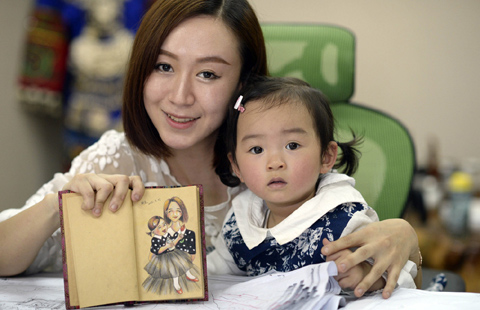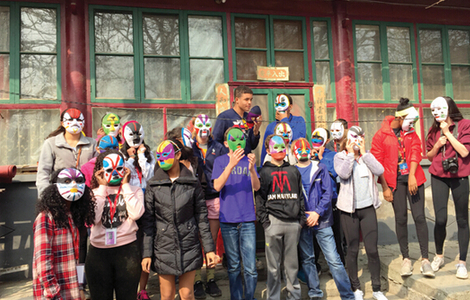Can Cantonese survive in America?
Updated: 2015-04-01 11:21
By Niu Yue in New York(China Daily USA)
|
|||||||||
 |
|
Sussi Su (center), teaches Cantonese to students at Hills Learning in Manhattan. Lu Huiquan / For China Daily |
Chinese characters, culture and courtesy. Ice-breaking small talk, homework review and students struggling to find the correct phrases in their notes.
Welcome to a Chinese class at Hills Learning, an Asian language-training institute in Midtown Manhattan. But at least 90 percent of Chinese people would not understand the language being taught in this classroom.
It wasn't Mandarin, the official dialect most people are referring to when they mention the Chinese language. This was Cantonese, a dialect spoken by some 70 million people mostly in Guangdong, Hong Kong and Macau.
For more than a century, Cantonese has also been the dominant language of Chinese communities within the United States, as most Chinese immigrants were from Cantonese-speaking areas, and the dialect still maintains its vitality.
For many jobs posted in New York City's Chinatown, Cantonese is a must. In visitors' lounges at hospitals, Cantonese-language soap operas are on televisions. There are still large numbers of families that speak Cantonese exclusively.
Kayla Chan, who works at the New York Asia Women's Center, a non-profit organization helping Asian women with domestic violence, child abuse and other issues, said many women she works with only spoke Cantonese, not Mandarin. To help in her job, she decided to learn Cantonese.
"You learn Mandarin, and you can reach more than 1 billion people. That definitely makes sense," said Russel Manlapat, a Chinese-Filipino-American computer engineer who is learning Cantonese. "The question is: are you going to communicate with many of the one billion people, or are you going to communicate with the people immediately around you."
"People say Mandarin is the business language, Mandarin is this, and Mandarin is that," said Jon Hills, director of Hills Learning. "Actually, our Cantonese program is going quite good."
Hills said one of his students switched from Mandarin to Cantonese because no one around him was speaking Mandarin.
Students learn Cantonese mainly because there are "significant others", such as spouses and family members, who speak it, said Hills.
"Our Cantonese classes do fill up to capacity when we open registration in the fall, over 100 students in total," said Tony Parisi, program director of Asian Language Exchange & Social Network, a volunteer-run network that teaches Asian languages. He said he would expand his Cantonese programs if he could find more teachers.
Demographic changes are underway in Chinese communities in the US and elsewhere. After China opened up to the world in the late 1970s, more Mandarin-speakers immigrated bringing change to the language landscape.
"The new Chinese families come from a wide range of geographic areas and educational backgrounds, so their dialects are no longer Cantonese only, and they don't live around Chinatowns either," said Shuhan Wang, president of ELE Consulting International and former executive director of Chinese language initiatives at the Asia Society.
Chinatown is no longer the only Chinese community in New York. Instead of heading to the Lower Manhattan area that is becoming increasingly gentrified, many Chinese immigrants are moving to 8th Avenue in Brooklyn and Flushing, Queens.
"When I came here, Cantonese was predominantly used, but now Mandarin is getting more and more important," said Chao Cheong, a Flushing-based wedding photographer who has been in New York for 20 years.
When mentioning Chinese in job interviews, said Hills, people are more likely to think it is Mandarin. Hills advises students to study Mandarin instead of Cantonese, unless they have specific needs to communicate with Cantonese-speaking people.
"Because of the fact that Mandarin (Putonghua) is the common speech in Chinese-speaking regions, most schools opt to teach Mandarin, if they teach Chinese at all," said Wang, adding that many Cantonese-speaking parents are also asking schools to teach Mandarin in school and leave Cantonese-learning to the family.
"There are many more factors influencing the teaching or maintaining of Cantonese or any dialect," said Wang, "including demographic, political, economic, educational and socio-cultural factors."
"[Cantonese-speaking] families and communities should come together to discuss strategies and tactics to engage in these issues," said Wang.
Cantonese and Mandarin teaching "are not exclusive to one another, or a matter of life and death", Sing Tao Daily, a Chinese-language newspaper, said in an editorial on Feb 22.
Lu Huiquan in New York contributed to this story.

 6 cultural differences between China and the US
6 cultural differences between China and the US
 Mother illustrates her pregnancy
Mother illustrates her pregnancy
 In memory of movie star Leslie Cheung
In memory of movie star Leslie Cheung
 Top 10 best employers in China in 2015
Top 10 best employers in China in 2015
 World's largest reclining Buddha statue in Jiangxi
World's largest reclining Buddha statue in Jiangxi
 First round-world solar flight stops in China
First round-world solar flight stops in China
 Elderly care explored for investors, needy
Elderly care explored for investors, needy
 Sasha Obama took trip to China
Sasha Obama took trip to China
Most Viewed
Editor's Picks

|

|

|

|

|

|
Today's Top News
US 'miscalculated' on AIIB: Albright
China PMI indicates factories back to expansion
Chinese woman charged with fraud remains in US jail
46 countries apply to AIIB
Tales of a nomad
US 'willing to work with AIIB': Lew
Silk Road connects China to the world: BOC chairman
Washington 'willing to work with AIIB'
US Weekly

|

|







